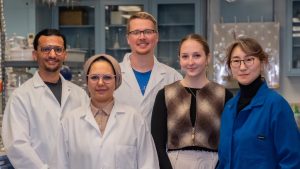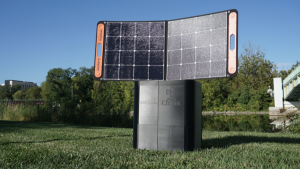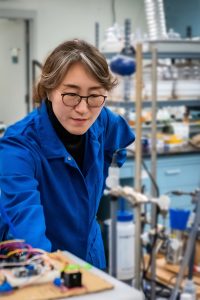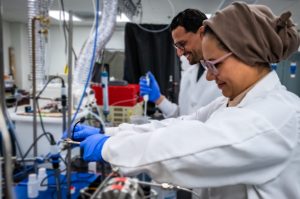As Dr. Joun Lee rode along a dirt road in India, she noticed a group of children playing in a puddle. Their faces were smiling with joy, but Lee’s attention turned to the water they were splashing in. The water was a strange purple color – a stark indicator of pollution. From that moment, Lee realized the critical need for accessible clean water.

Dr. Joun Lee (right) and the Pani Clean Team
As a Research Engineer from the University of Iowa and CEO of Pani Clean, Dr. Lee spearheads the development of sustainable technologies aimed at purifying water and producing green ammonia. The company’s innovative approach not only eliminates nitrates and other contaminants from water, but does so by leveraging renewable energy sources. This can be done in a rural setting, or at regional water treatment plants. This technology is especially crucial in regions where agricultural runoff exacerbates water pollution, posing severe health risks. Through the I-Corps program, Dr. Lee learned key insights about the industry, and how water treatment technology can be profitable.
Pani Clean’s Technology
Nitrates are the most common water pollutant worldwide; they come from a variety of sources, most commonly run-off from agriculture. Pani Clean’s novel technology treats nitrate polluted water. Powered by renewable energy, the company’s technology turns polluted water into clean water, ammonia, and a nitrate-free brine. Along with using the clean water, the ammonia produced can be sold to offset the cost of water treatment. The company’s first prototype, the M1, is designed for 300 gallons of water treatment a day – the average household’s water usage, and it is 100% solar-powered.
Our prototype has the capacity to purify the daily water consumption of an average household. Looking forward, we aim to integrate our technology within major water treatment infrastructures, such as Des Moines Waterworks. By applying our system to large-scale nitrate recovery operations, we have the capability to convert concentrated nitrates into pure ammonia and a nitrate-depleted brine, showcasing the versatility and impact of our solution on a broader scale. -Dr. Joun Lee

The M1 prototype
Growth Through I-Corps
Dr. Lee and her team were first introduced to I-Corps through the University of Iowa’s local program. There, the team learned business fundamentals.
Starting as a pure scientist, the exposure to the Business Model Canvas was enlightening. It transformed how we approached identifying clients and partners, making the learning process both enjoyable and invaluable.
After Iowa’s I-Corps program, the team moved on to the National NSF I-Corps program. This rigorous program provides teams with $50,000 to conduct 100 customer discovery interviews. The team found the conversations were insightful, uncovering the inherent challenges of marketing water treatment technologies.
Water is often seen as a given, like air. The challenge lies in making clean water accessible without imposing significant costs.
This insight led to a strategic pivot. The team discovered that converting nitrates into ammonia not only removed pollutants but also created a valuable by-product.
We realized that ammonia could be sold to local farms and even used as a clean energy source in the future. This approach allowed us to offset the costs of nitrate removal, making our solution economically viable.
The feedback garnered through the National I-Corps program enabled Pani Clean to refine their product to meet market needs effectively. This adaptability and insight have positioned Pani Clean to make an impact in the market, demonstrating the power of customer discovery in shaping successful innovations.

Dr. Lee in the Lab
The Future
Looking ahead, Pani Clean is poised for growth, with aspirations to deploy its technology globally, particularly in underserved communities burdened by nitrate-contaminated groundwater. Dr. Lee envisions a future where Pani Clean’s systems are instrumental in both industrial and community water treatment efforts, underscoring a commitment to mitigating water pollution on a worldwide scale. For Dr. Lee and Pani Clean, the future is filled with excitement.
Our vision is to expand treating industrial waste waters. In addition, we are dedicated to bringing our purification systems to underserved communities plagued by high concentrations of nitrate in their groundwater. We are committed to tackling and ameliorating water pollution challenges worldwide.

The Pani Clean team working on water purification technology.
Learn more about Pani Clean by visiting their website.
Interested in I-Corps? Learn more about our programs.
Quotes Edited for Clarity
Photos Courtesy of Pani Clean
NSF I-Corps Hub: Great Lakes Region, 2024
